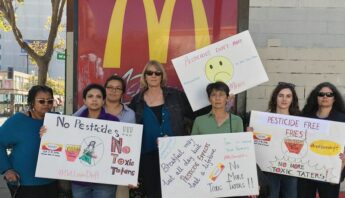For Immediate Release: May 22, 2014
Contacts:
Jessica Fujan, Food and Water Watch, 507-848-6856, jfujan@fwwatch.org
Bob Shimek, Toxic Taters Coalition, 218-214-1632, rjshimek@hotmail.com
Linda Wells, Pesticide Action Network, 563-940-1242, linda@panna.org
Toxic Taters Coalition to McDonald’s: Stop Misleading Shareholders!
Groups call out McDonald’s for its dubious 2020 sustainability pledges, while the company’s 2009 pledge to reduce pesticides goes unfulfilled
Oak Brook, IL – Supporters of the Toxic Taters Coalition showed up at the McDonald’s shareholder meeting today to call attention to the company’s history of making empty promises on issues of sustainability. Already under fire from so many environmental and labor organizations, McDonald’s released its 2020 Corporate Social Responsibility and Sustainability Goals last month, hoping to convince shareholders of a new direction. The Toxic Taters supporters delivered more than 20,000 petition signatures encouraging McDonald’s to focus on past sustainability commitments around pesticide reduction before making lofty future goals.
McDonald’s 2020 sustainability goals are ambitious, pledging improvements in waste management, energy efficiency, water conservation and sustainable sourcing of ingredients. However, the sustainability framework contains no firm commitments and McDonald’s is quick to point out that these goals are “aspirational” and subject to market limitations. This sounds all-too-familiar to members of the Toxic Taters Coalition, who are still waiting for measurable, public action on McDonald’s 2009 promise of pesticide reduction in potato fields.
In 2009, McDonald’s made a high-profile public commitment to work towards pesticide reductions on the potatoes they purchase. However, the company’s follow-through has fallen short of any tangible outcomes. McDonald’s has offered minimal new data about the agricultural practices of its potato suppliers. Meanwhile, local residents in Minnesota’s potato-producing regions continue to experience pesticide drift due to frequent pesticide applications.
“Very little has changed,” said Bob Shimek, a leader of the Toxic Taters Coalition and resident of White Earth Nation. “It’s time to move forward. It’s time for McDonald’s to take responsibility for the communities negatively impacted by their business.”
The Toxic Taters Campaign, formally launched in February of this year, is calling on McDonald’s to follow through with its commitments to work towards pesticide reduction. While the public-facing campaign is new, rural residents of Minnesota’s potato producing region have been dealing with negative impacts of pesticide drift for much longer. Motivated by health concerns and harms to livestock, the residents started working with Pesticide Action Network in 2006 to document pesticide drift using the Drift Catcher air monitoring device. A report released in 2012 showed several chemicals drifting from nearby potato fields. Of the samples taken in small towns bordering potato production, pesticides were detected in more than 66%.
“For years, communities near potato operations have faced an ongoing assault of highly hazardous pesticides,” said Linda Wells, Associate Organizing Director for Pesticide Action Network. “By raising the standards for their potato producers, McDonald's can help safeguard the health of rural residents nationwide.”
The potato producer that dominates in the Central Minnesota region, R. D. Offut Company, is the largest potato grower in the nation and sells to some of the nation’s largest potato buyers, including McDonald’s, the largest buyer in the U.S. McDonald’s buys about 7.5% of the domestic potato market each year, amounting to more than 3.4 billion pounds of potatoes in the U.S. alone. The fast food giant is known to have a powerful influence on potato growing practices, setting national standards for variety and growing practices.
The Toxic Taters Coalition is a network of rural residents from Central Minnesota, backed by several national nonprofit organizations including Pesticide Action Network, the Indigenous Environmental Network and Food and Water Watch. The coalition is asking McDonald’s to require that its potato suppliers – like RDO – achieve measurable and significant decreases in the use of health-harming pesticides, to release information on the chemicals their producers apply to their crops, and to ensure that its potato producers adopt environmentally sound agricultural practices.
Additional Resources
Toxic Taters website
MN Drift Report
McDonald’s Sustainability Report
###







